A fork in the road
For A. Guhanavel s/o Ashok Kumar, a Year 3 Data Science and Analytics student at the College of Humanities and Sciences (CHS), the turning point that propelled him on a journey of self-exploration started in the unlikeliest of places: a vaccination centre during the COVID-19 pandemic.
Ripple effects
At the centre where he worked part-time after his National Service, Guhan noticed a persistent problem: after being monitored for 30 minutes post-injection, patients would have to wait for up to an additional 10 minutes to be discharged because there was no proper queue system that assigned patients to follow-up counters in an orderly manner. Realising that this could be solved by designing a simple dashboard to tag and track patients’ waiting times, Guhan took the initiative to design his very first app.
Armed with little more than his self-taught programming know-how gleaned from an introductory computer science course online, Guhan spent a weekend designing the simple project on Excel — and his experiment paid off! Guhan’s app improved the administrative efficiency at the centre, allowing patients to be discharged within 2 minutes, which helped prevent patient overflow.
More importantly, it was Guhan’s first time creating something that tackled a real-world problem and had a tangible impact. Prior to this, Guhan, like many Singaporean students, mostly focused on performing well academically. “Before that, I was the typical eldest son living out the quintessential Singaporean narrative. That experience was deeply fulfilling for me. It was a small change, but it started a ripple effect,” he shares.
With the results of the dashboard app, the centre manager offered Guhan the opportunity to take on a managerial role and Guhan eventually gained some experience working as a supervisor at the vaccination centre. Spurred by this experience, Guhan made it his goal to step outside of his comfort zone and discover what he truly wanted in life.
Of football and data
Although his time at the vaccination centre opened his eyes to the power of his first major, Data Science and Analytics, Guhan's interest in the topic can be traced back to something else close to his heart — football. A hardcore Manchester United fan, Guhan and his mates used to follow the Fantasy Premier League where they would painstakingly analyse different player statistics to predict who would score goals, especially right before weekend games. “Looking back, we didn’t have any data science tools then, but essentially we were analysing the players’ data and studying their statistical probability of scoring. I could imagine then how much more data science could help me,” he recalls.
To all aspiring applicants, the third-year CHS student has this advice to offer:


As data science is still a fairly new course offered at NUS, a spirit of collaboration and support among faculty and students is key. Guhan shares that many in NUS have shaped and supported him on this journey, especially his peers in Data Science who are not only his trusted study buddies, but help ensure he keeps track of his Data Science classes and deadlines while juggling his two majors.
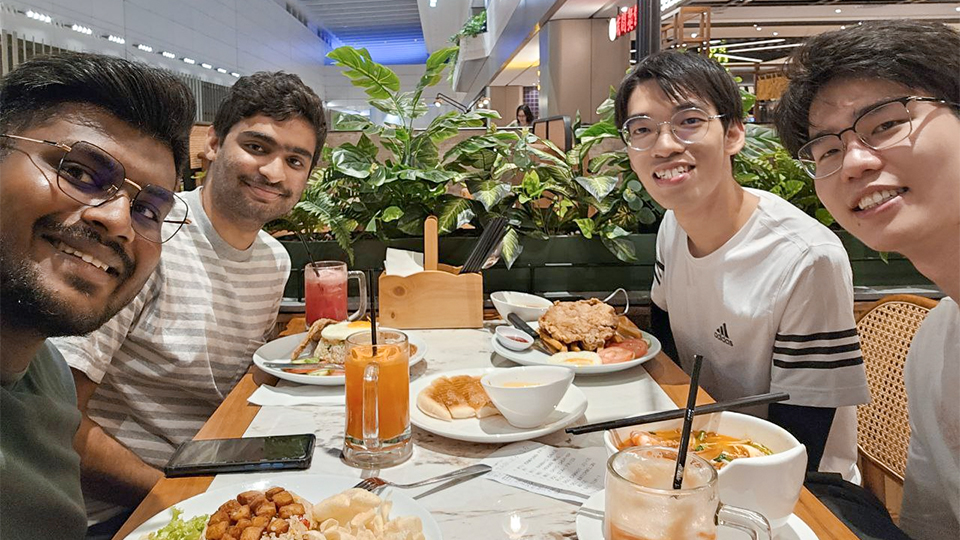 Guhan (first from left) enjoying a meal with his buddies from Data Science.
Guhan (first from left) enjoying a meal with his buddies from Data Science.
Designing what’s next
Although studying Data Science and Analytics at CHS was a natural choice for Guhan, his decision to take up a second major in Innovation and Design, which is offered by NUS College of Design and Engineering (CDE), was more spontaneous. He had chanced upon an email about the NUS Enterprise Summer Programme in Entrepreneurship and jumped at the opportunity — a spur-of-the-moment call that proved to be life-changing. Through this summer programme, he first came up with the idea for his EdTech startup, Chingu (meaning “friend” in Korean), a personalised AI-driven language learning platform enhancing conversational fluency for those studying Korean.


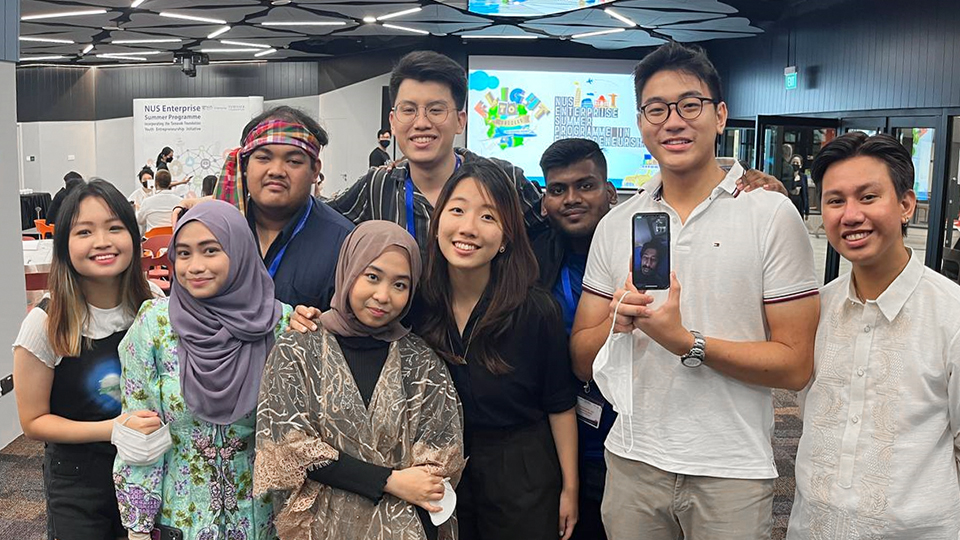 Guhan (back row, centre) with his fellow NUS Enterprise Summer Programme attendees.
Guhan (back row, centre) with his fellow NUS Enterprise Summer Programme attendees.
Wanting to strengthen the foundations of Chingu, Guhan then decided to enrol in the Innovation and Design Programme (iDP) in order to develop his design thinking skills and sharpen his business acumen. At iDP, students from different disciplines learn various tools and processes for ideation and design by working together on projects that have a real-world impact. Chingu was therefore a perfect fit for iDP and Guhan was grateful that Associate Professor Khoo Eng Tat enthusiastically guided him and his co-founder through the incubation process.
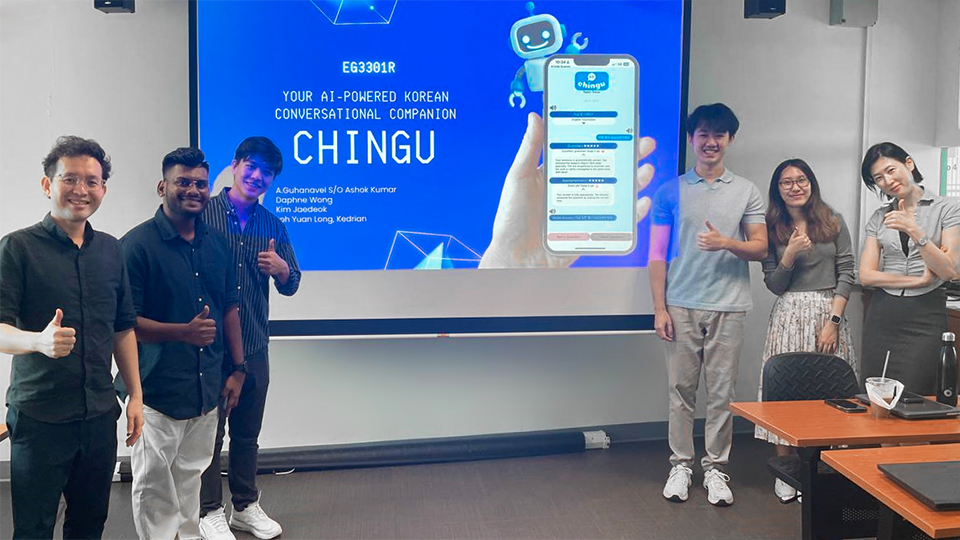 Professor Khoo (first from left) with Guhan (second from left) and his other teammates after their presentation of Chingu.
Professor Khoo (first from left) with Guhan (second from left) and his other teammates after their presentation of Chingu.
While the choice of doing double majors — one from CHS and one from CDE — was purely coincidental, Guhan now sees this unique combination as crucial for Chingu and innovation at large.


Always looking forward, Guhan is keen to embark on his next adventure in January 2024 at the NUS Overseas Colleges (NOC) Munich programme, where he will be interning at Erium, a software and service provider for data analysis, machine learning and predictive modelling in the manufacturing industry. As Erium is a small start-up comprising eight staff members, Guhan will have the chance to rotate among different roles and not only work in generative AI development, but also pick up critical management skills. He shares: “It’s an important crossroad for both me and Chingu, where I transit to learn how to manage both the technical and commercial sides of a start-up.”
A confluence of influences
Guhan also feels that the CHS common curriculum courses help bridge diverse disciplines, equipping students like himself with a holistic worldview and versatile skill set. He shares how two such courses helped him and his teammates clinch the title of champions at the 2022 MaritimeONE Digital Challenge’s PSA Cargo Solutions challenge: “In HSI1000: How Science Works, Why Science Works, the knowledge we learnt about decarbonisation allowed me to build a carbon dioxide optimiser dashboard for cargo transportation. In addition, taking HS2904: Driving Towards the Future: Battery Electric Vehicles was helpful in understanding market shifts and economic concepts such as opportunity cost and vertical integration — all of which came together when we were crafting our proposal solution.”
Modestly calling their win “a miracle”, the CHS student also credits his second major in iDP for giving his team the winning edge. He believes that their user interface and algorithms were average but their proposal’s unique combination of analytical and design-thinking perspectives helped them stand out for the win. “All three teams used the exact same algorithms, but our ability to articulate our idea, the user perspective and the implementation plan was the winning shot. My three-year journey at NUS can best be encapsulated by this single competition,” he laughs.
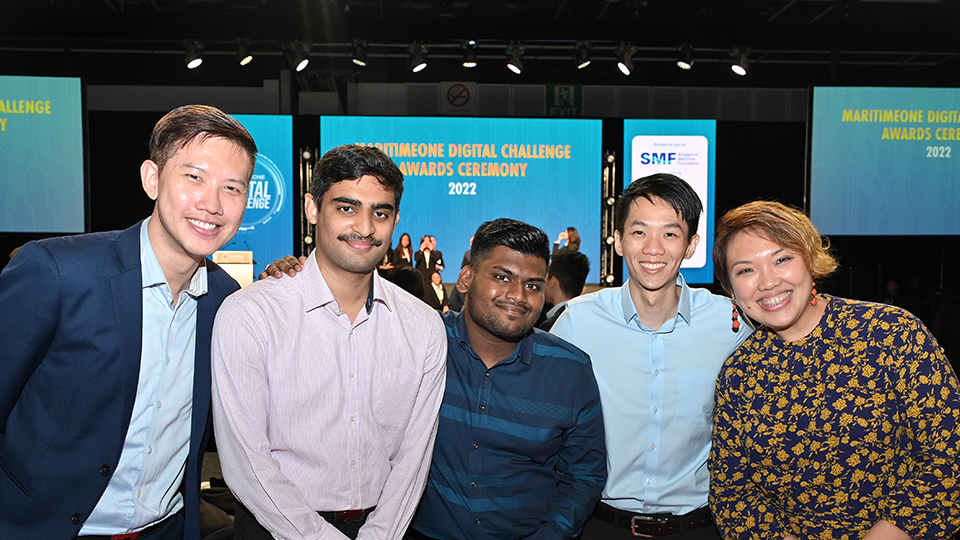 Guhan (first from left) and his teammates celebrating their win.
Guhan (first from left) and his teammates celebrating their win.
Shaping the next generation
As the first person to attend university in his family, Guhan grew up listening to his father espouse the importance of education. Now life has come full circle: thanks to Guhan’s encouragement, his father is currently doing his part-time undergraduate degree in the Singapore University of Social Sciences.
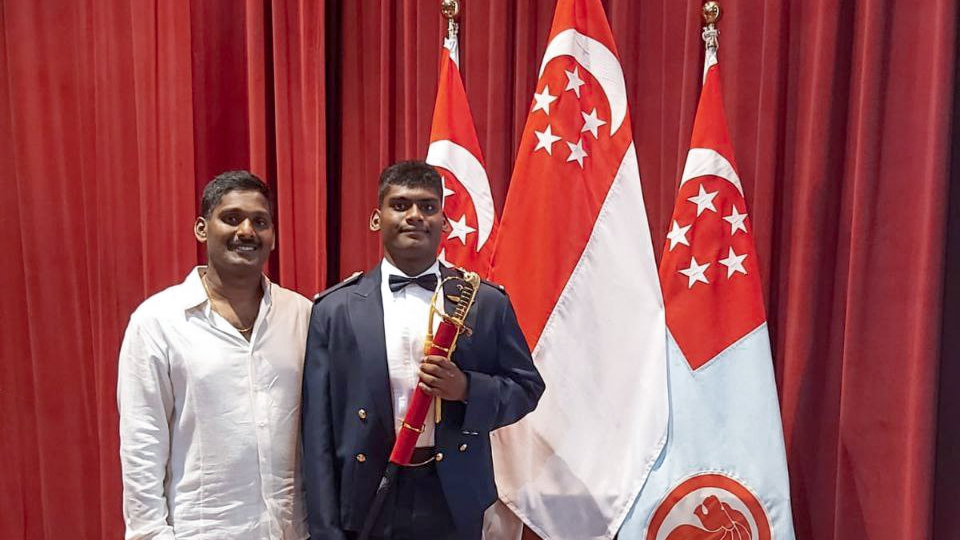 Guhan (right) with his father, who is an SAF Regular.
Guhan (right) with his father, who is an SAF Regular.
Special moments like this make Guhan feel that his measure of true success is when people can see him as their role model and be inspired to shape their own future.

